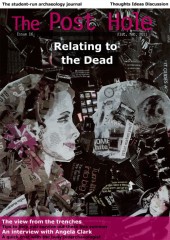Some months have passed since my article on archaeological theory was published in The Post Hole (see issue 13). Since then, there has been a critique of my argument by the esteemed David Roberts (2010, see issue 14), and a variety of personal reactions by people in my department, all of which I would like to now address in this follow-up.
Post-post processualism?
I will turn first to several points by Roberts, whose position has been to take a positive view of post-processualism rather than a negative one. In contrast to my problem with its slipperiness and incoherence, he emphasises its decentralisation and self-criticism:
"This maelstrom of theory has lead to some processual archaeologists bemoaning post-processualism's 'chameleon-like' nature, which change their form under criticism but maintain their essential characteristics...This is not, however, a function of 'post-processual' scholars' inherently slippery and sly nature...but rather a natural outcome of the attempts by processualist scholars to squeeze the multiple and often contradictory theories of those disagreeing with them into the neat boxes and categories of which their 'systems thinking'."
All this would be very well, if it were not for the fact that in his very next paragraph he dismisses all indefensible post-processual positions (such as those by Shanks, Tilley and Bender) as 'extreme', and all those he favours as 'subtle' -in fact, he even brands them under a different name, 'holistic contextualism'! He follows this up by securing his position: all critiques of his point of view would be 'systems thinking'. This is apparently directed at processualists, but it also applies to both myself, and other 'extremist' post-processualists unfortunate enough to appear on Roberts' radar. Where is the promised debate? Where is the progressive self-criticism? Roberts has evacuated it to an elite club of his holistic contextualist friends, of course.
He has a second point to make about theory in Roman archaeology: it is that post-processualism has opened up debate in this sphere, rather than (as I argued) taken the emphasis away from urbanism and economy and handed it to acculturative models and identity. In this he has little reply except in his claim that post-processualism has gone beyond the 'desolate systems of processualism' in integrating the functional with the social, improving the debate over urbanism (contra Preece 2010). In addition:
"These studies have in common a concern with rigorous data gathering, particularly excavation and geoarchaeological survey"
More discerning readers might draw significant links between those 'rigid' and 'desolate' systems and Roberts' 'rigorous data gathering' -in investing in excavation techniques he is deliberately ignoring debates regarding the value of intrusive archaeology by post-processualists in archaeological academia (see Shanks & McGuire 1996; Tilley 1989; and Lucas 2001).
Of course, he could jettison these notions as ideas 'contradictory' to his, as he threatened in the first quote, if it were not for the fact that he has already attacked processualism and its mechanical nature. If we are to accept that half his ideas are processual, and that he is making a deliberate choice to stand up to the anti-excavation-shift of Shanks/McGuire/Tilley/Lucas fame, where does he stand?
I am not proposing that we categorise archaeological thought into 'processual' and 'post-processual' -I think it is pointless to try- but Roberts has already demonstrated a willingness to do so, drawing sharp distinctions between 'old thought' and 'new thought'. As I argued last year, we should not be afraid to emphasise the links between the traditional discipline and the post-processual frameworks.
The democracy charge
Other responses to my article that I have encountered personally seem to have been cautiously appraising, or outright nervous. A large part of it might be bemusement: post-processualism is almost universally accepted amongst the staff, and also among students inclined towards theory. Post-processualism, furthermore, has always been championed as the David to processualism's Goliath; a rebel cause that has long since forgotten that it is now the one calling the shots. But there is also a more developed reaction I am encountering for the first time, and it goes something like this:
"Post-processualism accepts everyone's point of view and evaluates them all as valid. So, although you may not like post-processualism, you have to admit it's better at making archaeology much more accessible to the public, more egalitarian, and less scientific."
While it is important to recognise that many post-processualists have expressed a commitment to open archaeology up to the public, and that this has all sorts of benefits attached to it, it is ridiculous to suggest that no-one before 1980 attempted to do so. What really is new about the post-processualist strategy is the idea that we should democratise archaeology: get non-archaeologists involved. This is where Shanks and McGuire (1996), Tilley (1989) and Lucas (2001) come in. They believe that only the interpretation side of excavation matters, so we should produce archaeology for them, not for our research agenda or scientific credentials. Roberts is right in that not everyone is agreed in post-processualism and none of the above views exactly align. Another post-processualist, Cornelius Holtorf, even goes one step further by claiming we need to introduce 'public inreach' (Holtorf 2007a), embracing clichés and the private sector along the way. In his relativist philosophy, the public perception of archaeology is just as valid as the academic one, and perhaps better because of the lack of ivory towers (see Holtorf 2007b, esp. chapter 6). While I am not against the principles of democracy or egalitarianism, I do think there are problems associated with letting non-professionals and developers set the agenda, and that research agendas are not just rags of paper with 'science' written on them. Without research agendas we would not be able to determine what potential sites might hold, and, having excavated it, what the relevance is in light of previous discoveries. Relating to the public what we have found is not 'elitism', it is merely one community of professionals -defined as people who have dedicated their lives to focusing on material culture- telling those who are only casually interested what might be going on. If this is done in an elitist way, it is being done wrong; it is not the structure of the relationship that is at fault, but the attitude of the researcher.
Conclusion
I could write further, but there is only so much I can include in this article. But to summarise, the purpose of the last article -and this one- was and never has been to demolish anyone's entire philosophy. It has been intended as a challenge to post-processualists to explain themselves, to fully acknowledge the debt that they owe others who have gone before, and to attack some assumptions that are taken for granted. If this has inspired rethink and debate, this is all to the good -I believe that Roberts' defense of post-processualism has not protected it at all. Rather, it seems that he has abandoned huge sections of it in order to advance another distinct framework. If others were to do the same, we would really discard the binary purgatory that is the post-processualism/processualism debate.
Bibliography
- Holtorf, C. (2007a) 'Can You Hear Me At The Back? Archaeology, Communication and Society', European Journal of Archaeology 10: 149-165.
- Holtorf, C. (2007b) Archaeology Is a Brand! : The Meaning of Archaeology in Contemporary Popular Culture. Oxford: Archaeopress.
- Lucas, G. (2001) 'Destruction and the Rhetoric of Excavation', Norwegian Archaeological Review 34: 35-46.
- Roberts, D. (2010) A Reply to Preece - Hole-Istic Post-Post-Processualism?, The Post Hole 14.
- Shanks, M and McGuire, RH (1996) 'The Craft of Archaeology', American Antiquity 61 (1), 75-88.
- Tilley, C. (1989) 'Excavation as Theatre', Antiquity 63: 275-80.




